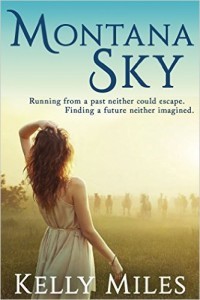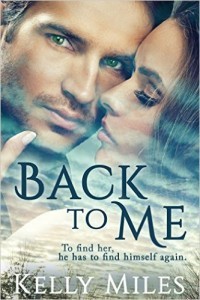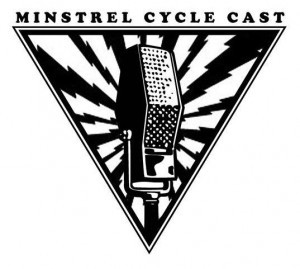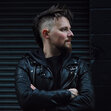Konn Lavery's Blog: Posts from konnlavery.com, page 57
February 14, 2016
Discussion with Kelly Miles on being an Indie Author
This blog post we have guest author Kelly Miles who was willing to take some time to talk about her writing and discuss her experiences with being in the indie book industry. She has written two books available on Amazon and is active online on her website and numerous social media websites. Let me introduce Kelly to you:
Kelly thanks for taking the time to offer your expertise and experiences as an indie author. Can you give us a brief introduction about you and your writing?
Well, I’m a wife and mom of two teenage boys. I live a fairly normal life, though crazy-busy most days. I live in Tennessee, just a few miles from where I grew up. I’m an upbeat person (most days) and I believe helping and giving to others is one of the greatest joys in life. If I can make just one-person smile, then it’s worth it. I’m also a romance writer, usually with some suspense thrown in for good measure. I currently have two novels that I’ve released, Montana Sky and Back to Me, which was released this past November. I’m working on my third, Blake’s Hope, hopefully due out later this year. I have several other projects going as well, and one in particular that I’m very excited about.
What made you want to peruse being an indie author?
I don’t know that being an author was ever really on my radar. It just kind of happened. Some might know my story, but for those who don’t I will try and keep it brief. I was diagnosed with dilated cardiomyopathy and chronic congestive heart failure eleven years ago this fall. As per doctor’s orders, I had to keep a journal. It was just boring, routine stuff mainly, but eventually it turned into writing more interesting things to keep myself busy! I wrote 2 novels that have yet to be released and they may never be. I don’t know. They’re a bit more personal since they were written during that very difficult time. I keep them tucked away and hope to get back to them one day when things calm down.
As an indie author you have to do a lot of self-promotion, do you find yourself spending more time marketing than writing?
Absolutely. It’s a full-time job, but a necessary one. Being an indie author, you don’t have a publicist, or a marketing team handling things for you. You are the team. And it takes work and dedication. A lot of dedication. Social media is obviously a useful tool in today’s society and one that indie authors really need to take advantage of. I recently did a blog post on my website about this very thing. If I could say anything about marketing, it’d be this… it’s important to keep your personal media accounts separate from your professional one. You are promoting yourself and your books, not your dogs and children. They may be cute, but more than likely they will not sell your books and you will be overlooked. There are several places you can hire, of course, to do these things for you, but I always caution for authors to read the fine print and understand exactly what you’ll be getting. If you are dedicated and committed, you can do as much if not more on your own, and the best part is it’s free. You just have to be willing to put in the time necessary to be successful.
With marketing, has online or offline been more effective for you to connect with new readers?
I would definitely say online, though I’ve not given offline (mailings, etc.) a fair chance. Word of mouth is great if you know a lot of people, who know a lot of people, but even then you’re depending on others to market for you. With so many great resources available online (Twitter, Facebook, Goodreads) connecting with others is just a click away. Every share is a share to their followers. Every tweet is a tweet to their followers. It eventually gets around. There are also several author support groups you can join, which I highly recommend. You’ll need it.
You mention that you have always wanted to write and decided to bite the bullet and just do it, what was the most challenging obstacle for you?
Discipline. It’s so easy to get distracted with day to day life, especially when you have kids. I try to enforce my rule of writing 30 minutes every day, though admittedly I break that rule from time to time. I think if you make it a priority, it becomes a habit. A habit becomes routine. It doesn’t matter if you’re writing a blog post, knocking out another chapter in your book, or sending a greeting card to someone. If you get in the habit of writing, it will become as natural as waking up in the morning. The more you write, the more your craft is perfected.
Did you have any advice or mentors (writing, marketing, etc.) during your journey? Or trial and error?
That’s easy… definitely trial and error. I had absolutely no clue what I was doing when I started this process a few short years ago. To me it was as simple as I wrote a book, now what? I researched as much as I could. I followed other authors and signed up on author forums. I listened and I observed. Some of it was beneficial and some a waste of time. I think each individual should do what suits him/her best. I would say the key things of importance are, 1) make sure your book is edited, edited, and edited again. I promise every time you go over it; every new pair of eyes will catch something you missed. If your writing is clunky, filled with punctuation and spelling errors, it will turn readers off. 2) Invest in a good, solid book cover. Let’s face it, we all judge a book by its cover. You need to have something that will grab the reader’s attention, not put them off. If they see a cheap cover, chances are they will think you didn’t invest that time into your writing either. Those are two of the most critical pieces of advice I can give.
If you could go back and release your first book with the knowledge you have today, would you do anything different?
Yes, I would have not been so quick to release it. It was my very first novel and I was a bit over zealous when it came to hitting the publish button. I was so excited to have it out there and nervous as well. A lot of it was personal things that had happened in my life. I think I was afraid that if I didn’t just put it out there, I never would. It’s important to sit on it for a bit. Stew on it. Let it mingle in your mind. Once it’s out there, that’s it. Sure you can revise it, but the chances are someone’s already seen it or downloaded it, and those you can’t take back. Make sure it’s exactly the way you want it to be.
Would you consider going the traditional publishing route? Why or why not?
I’ve not really ever thought about it. I’ve been please with self-publishing, so at this point I would say no. I think partly it’s fear of rejection. No one likes that, right? The other side of it is I like having a say in my work. It’s my baby. It’s what I’ve worked on day and night, and shed blood, sweat, and tears for. I like having control over something that is an extension of me. I don’t begrudge authors either way, of course. Again, I think it’s a personal choice. I would like to point out one thing. Some people have said, or feel, that unless you are represented by a publishing house that you aren’t considered an author. I wish people would drop that from their minds. There are hundreds of thousands of indie authors who are blessed with incredible talent. Amazing novels come from self-published authors every day. We should lose the stigma attached to the labels, and recognize that anyone willing to bear their soul to the world through their writing is indeed an author.
What are you currently working on?
Lots of projects are currently in the works. I’m finishing up my 3rd novel, Blake’s Hope. I am hoping to release it later in the fall of this year. Fingers crossed! I’m also working on some revisions and editing, as well as promoting other indie authors. It is truly a cause near and dear to my heart. Indie authors will be featured on my website every Friday (www.authorkellymiles.com) and will have links to their books, as well as author interviews. I think it’s important for authors to support one another and my goal is to gain exposure for all of those who wish to build their brand. I’m also doing a book tour starting in March, and a book signing coming up in May.
Thanks again for your time Kelly, insightful knowledge into your writing. You can find Kelly’s work on Amazon:
You can also find her on the following social media websites:
The post Discussion with Kelly Miles on being an Indie Author appeared first on Konn Lavery.
February 3, 2016
Why You Should Keep an Idea Book
Being a writer, or anyone in a creative line of work, you probably find many ideas come to you all the time. Unfortunately ideas are dime a dozen and numerous concepts come to mind daily. Now, that doesn’t mean that they are all bad. There can be some real gems when you are inspired by something or through a dream or from a random thought.
What do you do with all these ideas?
If you tried to peruse every idea you come up with, you’ll drive yourself crazy. There simply isn’t enough time, energy or resources to do everything. You’re better off picking one and doing a good job at it. What about all of those other ideas? Keep note of the thoughts, you might be missing out on some fantastic concepts for the future. This is where having a notebook (or idea book) is valuable.
Use the idea book as a resource of raw concepts, don’t criticize your notes.
Keeping a book to jot down ideas with you on the go or by your bedside allows you to capture that thought in the moment. Idea books should be used a lot like a sketch book for drawing. They’re for exploring and keeping concepts, regardless of how rough or senseless they may be.
It’s an Assistant for Writing Blocks
Ever run into a writing block? I bet you have. Specifically when writing fiction, coming up with a plot that has an engaging storyline and characters isn’t completed on the first go. Researching for inspiration is a strong tool to hash out a direction for your story. An idea book works as a hub of inspiration from your past thoughts.
Write down plot outlines (large or small), characters, places, objects or discoveries.
It’s a notebook, use it for notes. Writing down ideas when they are most prominent in your mind will keep the idea alive for the future. Plus it’s a bit of a relief to write the thought down and get it out of your mind.
Your Notes Are For You.
You’re not presenting a masterpiece here, scribble where you want, draw pictures or jump pages. However you want to use it is up to you. The big thing is to write something down when you have a thought.
Idea books will vary greatly from person to person. I keep my current one in a line-papered book and it’s filled with point-form notes, full paragraphs and quick sketches. It comes in handy when needing to think outside the box and explore new ideas. So if you haven’t made one yet, grab a notebook and get jotting!
January 31, 2016
Getting Away!
Last week was the first vacation in 2 years – wow. As a follow up from the last blog post about creative outlets, it really helps to physically leave your regular space. This is how the vacation was born, a trip down to Banff where I was able to get out of my routine and actually appreciate my surroundings.

We spend way too much time being “plugged in” and forget to see what is right in front of us. If we go to the same places day in and day out and do the same thing, how are we supposed to grow as a person? There’s no challenge and our minds get lazy. Getting out of the city offered some time to self-reflect and familiarize with myself. Also, new beer. That was a big plus.
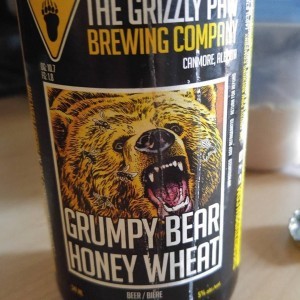
I hadn’t been in Banff since I was a kid so seeing it with new eyes was exciting and instantaneously I began thinking:
Banff would be a great setting for a horror story.
It’s been done already, sure, but there’s a rich history there and enough tourists that it could make quite the creepypasta (horror story). Something I’ll put in the idea sketch book.
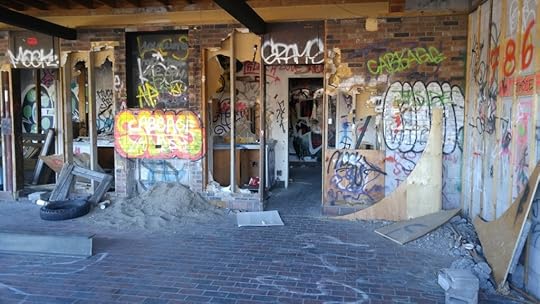
As a compliment to that thought, at the end of the trip we found a fun abandoned gas station just outside of Canmore. We wandered around the outside of the building, explored the interior where we found a pitch-black men’s room behind a sticky door, a basement and a hangout spot with couches in the back. We chickened out and didn’t check out the basement…
Looking like there will have to be a follow up visit. Until then, it’s back to the concrete jungle.
Some additional shots from the trip.
Click an image to enlarge.
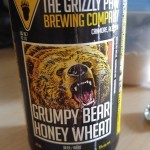



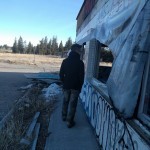




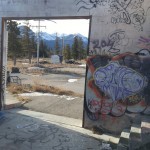
January 20, 2016
Benefits of A Creative Outlet
The majority of my blog is focused on writing, making other aspect of what I do overlooked. For the past several weeks I have been taking some time away from writing to refresh my creativity. To do this, I decided to visit my other creative interest – music. As I mentioned in a previous post, taking some time away from writing to clear your head is mentally healthy and often will be more productive if you have been run dry and not making much progress. For this, I decided to step back from writing since NaNoWriMo 2015.
Why Is Have An Alternative Outlet Important?
Having another creative outlet allows your mind run wild in places it hasn’t gone before. It lets you push new boundaries in your own thought process. To maximize on this, having the outlet differ from your regular goals (writing, for example), forces you to think differently from your regular thinking patterns. This will help broaden your mind and inevitably help your creativity.
Pick Another Interest You’ve Had.
Find an activity that you have interest in so you have a drive to try it out. Ideally something that uses a different part of the brain so you aren’t using the same thought patterns as you do with writing. My own outlet is music, specifically industrial music. If you are unaware of industrial music, it is a genre with very few limits and often used as an umbrella term for a lot of harsh and aggressive electronic sub genres. Nine Inch Nails or Skinny Puppy are more commonly known bands in this genre. I grew up listening to industrial from an early age and was always curious how the music was made.
Push Yourself Out of Your Familiar Comfort Zone.
Start this new direction when you are at your wits end with what you are currently doing. That should be a good sign it is a time for change. Since 2012 I have been jamming for fun, composing industrial tracks on my spare time. I decided to pick up music because I was mentally stagnant. I wasn’t growing or learning as I was in the previous years. I felt like I was stuck.
Don’t take it seriously.
The point of the new outlet is to remove yourself from your day to day actives and explore uncharted boundaries. If you start taking it seriously you will naturally put up mental restrictions and treat this outlet as a chore or task. Relax, have fun with it.
Due to my long-term fascination with industrial music I chose to take up learning how to make this kind of tune and have been continually learning it since. It now serves as a stress reliever or if I need an escape from my day to day routine. Even though I don’t take it seriously, I do want to grow in this direction to explore music theory, instruments and recording.
Here’s a tid bit of what I record:
As mentioned at the start, if you find yourself mentally stuck or exhausted then perhaps it is time to use an outlet to give yourself a clear head.
Do you have an outlet from your writing or regular routine?
January 13, 2016
Discussing the Horror Genre with Author Mercedes Fox
This blog post we have guest author Mercedes Fox who is a self-published horror author from Colorado. A canine enthusiast who has written three books tackling the sub-genre of werewolves. We met on the website Goodreads and have discussed writing on her blog initially then jumped on over to my own to chat about the horror genre in writing.
Mercedes, first off thanks for taking the time to discuss writing horror with me and for the readers. I’m excited to hear your thoughts.
Can you give us an introduction to yourself Mercedes?
Sure thing. Before I got the nerve to publish my first book four years ago, I’d always dreamt about being an author. I’ve wanted to write since childhood and I have written but that’s where it ended. I’m married with three furbabies. Currently I write full time or at least that’s what I tell myself.
Tell us about your dog!
I have three. Hank is our first baby. He’s a nine year old German Shorthaired Pointer who’s very spoiled, though he’ll tell you otherwise. He just doesn’t get why he can’t have all the treats in the bag.
Ackley is the middle baby. He’s a seven year old English Springer Spaniel. We call him Velcro dog because he must always be touching you. And he’s a big chicken. He had a run in two years ago with a rattlesnake. We were on vacation and he spent the week in the hospital. Since then he’s gotten very round. He’s about 40lbs overweight but he doesn’t eat a lot. I figure it’s due to the snake venom. The vet told us it was good he was bit round when he was attacked. The venom died out going through all his fat.
Beamer is the baby. He’s a four year old German Shorthaired Pointer. He’s very rotten and knows he’s got his mom wrapped around his little paw. He’s always on the go. He runs everywhere at high speed. We want to breed him at some point. We want to keep his bloodline going. He’s wicked smart and his bloodline is full of field trial champions.
All three are hunting dogs and good at it, but first and foremost they are our kids.
How come you decided to write about horror (and werewolves)?
I’ve loved werewolves and werewolf novels as far back as I can remember. I write about them because that’s what I like to read.
Where does your horror inspiration come from (beyond canines)?
Oh I have a very wild imagination. I can scare myself pretty easy.
Horror can be quite niched or criticized for unoriginality, how do you approach writing horror?
This is very true especially of the vampire and werewolf genre. With werewolves you can play around with their myth a bit. Such as how one becomes a werewolf, do they require a full moon or are they just mindless beasts eating everything. I combine a little of everything and wallllaa you have my werewolves. One thing that has always irked me about werewolves is the tail. For some reason if the werewolf in question walks on his hind legs he has no tail. But if the werewolf looks just like a wolf they have a tail. My werewolves have to have a tail and snout. I’ve liked the smashed in face.
What do you find is the biggest challenge in writing horror?
Gore or not to gore. I like gore, descriptive killing and explicit sex. To me that’s required. I enjoy books that shock and/or scare me. I try to write that.
Do you plan on writing in other genres or topics?
I want to try a who-done-it mystery but I’m not sure if I can write something without a werewolf in it?
How long have you been writing for (personally and professionally)?
Since childhood for myself. About four years ago I decided to be a real author.
You self-published, how come?
No way did I want to wait on publishers or get the rejections. And I don’t like the idea of the publisher owning my work. It’s my story, my words and I don’t care to be told how to write it or rewrite it. Also the time frame—self publishing means I can put it out now.
Do you spend more time marketing online (social networking, blogs, etc.) or in person (book signings, consignment stores, etc.)?
It’s all online. I’ve tried Barnes and Noble and a couple local stores. Barnes and Noble has never bothered to even say No. The local book store has closed down which was very sad, they were the only one in town. I did sell a couple copies there.
Any final thoughts you’d like to share with us?
I hang onto the hope I might someday see my books on the shelf in Barnes and Noble.
Thanks for sharing your thoughts about horror, werewolves and writing Mercedes! It was quite insightful to hear your writing journey. I too have the same thoughts about traditional publishing and have experienced struggles with book stores/consignment as a self-published author. Rejection is a common trait shared amongst writers in the industry, keeping your head up high and learning from the experiences is the best way to carry on.
Until next time!
You can find Mercedes Fox’s novels on Amazon:
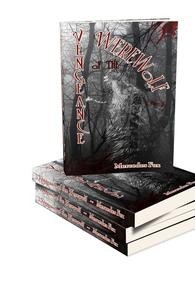
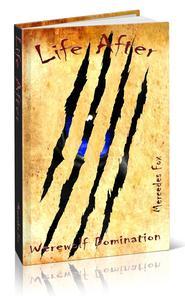
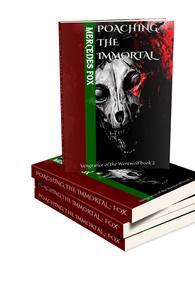
Click on a book above to visit it on Amazon.
Or follow her on Twitter or Facebook or on her website.
January 6, 2016
5 Tips to Build Writing Habits
At the start of each year people often set up New Year’s Resolutions/goals for themselves. Perhaps it is time to tackle that manuscript you have been wanting to work on. Maybe you want to continue a novel that you haven’t been able to set time to work on. Reasons aside, let the New Year be an opportunity to finally tackle your writing passion!
How Do You Start?
Well that is easy, pick up the pencil or open your word processor app and get writing!
Seriously though, the five points listed below will help you avoid falling through the cracks and forgetting your goal of writing . It is easy to set an objective for the New Year after the Holidays when there is some downtime. The challenge is keeping up with it as the year picks up momentum.
1. Write down your goal for the year.
Yes, write your goal down on a piece of paper. This may sound pointless as you aren’t making any direct progress in your writing however this does give you a 5,000 foot view of what you are wanting to achieve this year. Be realistic with the goal and do not be afraid to push yourself. Perhaps the goal is “I want to finish the first draft of my manuscript”. Or “I want to finalize the editing portion of my manuscript”.
2. Dedicate a minimum of half an hour a day to work on your writing
Do this religiously. This is the most crucial point when it comes to setting a goal. Setting aside a minimum of half an hour a day to work on your writing guarantees some progress in it. Aim for higher, around an hour or two to make some real progress. If that is not possible, set aside some time each day to write whether that is a part of your morning routine, lunch break or in the evening. Pick a time that will work best for you when you won’t have many interruptions.
3. Take your writing seriously
To remain motivated with working on your book you need to treat it as a critical task. If it is something that you like to do only when you’re in the mood to write or have nothing else going on, chances are you won’t power through the challenging parts of writing. If you want your writing to be taken seriously it starts with your perspective towards it.
4. Make Adjustments to your routine
The previous points mention consistency and treating your writing as a high priority. This means you might have to make some adjustments to your current lifestyle. Perhaps you have to be more selective on your outings or cannot watch as much Netflix as you did last year. Self-reflect on where your time is going and see what you can cut back on to invest in your writing. The truth is you do have to make some sacrifice.
5.Reward yourself
An important point a lot of people need to remember is to reward yourself. It is very easy to keep on working and forgetting to celebrate when reaching milestones. When you finish a chapter treat yourself to a good coffee or maybe beer. Leaped over that writer’s block? Awesome, take some time to do something else, like do a dance or something.
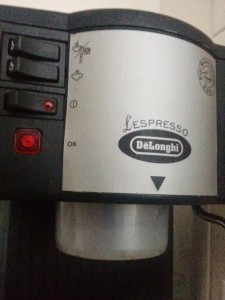 Coffee is a fantastic reward.
Coffee is a fantastic reward.
These are some tactics that you can use to pursue your writing. Habits are built from repetition, so keep writing every day. You’ll be surprised how much ground you can cover in the span of one year as long as your remain consistent with your routine.
December 31, 2015
End of 2015… What’s Next?
Another year has come and gone, wow. Where did 2015 go? Regardless of where it went, the past 365 days have been filled with ambitious goals and fun events. First off, I would like to give a big thanks to everyone who has been a part of my life and helped me continually pursue my dreams. So now that 2016 is right around the corner, what is next?
New horror novel, Seed Me, in the fall of 2016
I talked a lot about this horror novel Seed Me throughout 2015 that I wrote during NaNoWriMo 2014. The spring was spent revamping the plot and self-editing before passing it along to my editor. Currently I am working on the cover art, synopsis and other exciting features that will go along with the launch of the book in the fall of 2016. Keep a watch out early next year for more news about it.
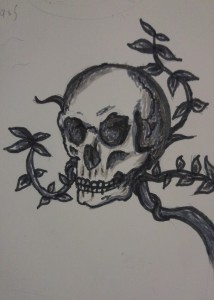 Concept sketch of a plant lifting a skull for the novel Seed Me
Concept sketch of a plant lifting a skull for the novel Seed Me
More Blogs with interviews, tips, and what else I do beyond writing
I am gradually getting the hang of this blogging thing. I will be sticking with it and continue to evolve the topics with interviews of other authors/creative types. More writing advice and other things I do beyond books.
Mental Damnation 4?
That’s right, between the blogging, new novel and making a living to put food on my table, I will be revisiting the Mental Damnation series. Fusion (the third installment in the series) was released in the fall of 2014. Already 85% of the fourth book is complete and fully edited, it was sliced out of Fusion as the book would have been twice as long.
Due to the depth of the Mental Damnation storyline, I’ll be reviewing and planning ahead for the fourth installment of Mental Damnation and begin outlining the plot for the remainder of the series. This book is projected for early 2017 though, so don’t get too excited… yet.
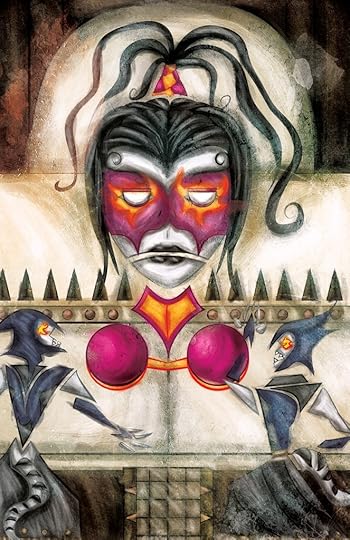 Illustration to be seen in the fourth Mental Damnation novel
Illustration to be seen in the fourth Mental Damnation novel
I’ve never been a fan of New Year’s Resolutions, forcing change upon yourself is not something I stand by. I do however believe in setting goals (hence the ones above), which are progression of plans that were set this year and even last year. 2015 has been plentiful and 2016 will be even more exciting with a brand new book and other projects. Those I will keep on the down low until there’s more solid info on them.
Also hoping 2016 brings more dinosaurs. Until the New Year!
December 29, 2015
Guest on the Minstrel Cycle Podcast
A couple months back I was on the Minstrel Cycle podcast to chat about my Mental Damnation novel series and the upcoming Seed Me novel for 2016. Give the podcast a listen for some jokes, laughs and NSFW (Not Safe For Work) material. You’ve been warned!
Episode 0007 – Konn Lavery19-11-2015
This marks the forst of what will likely be many episodes featuring Konn Lavery. He stops by to talk about his book series Mental Damnation, and touches a bit on design, industrial music and horror films. He and Dave go back a ways, as he was one of Dave’s teachers at Guru (when it was called guru). Also, Jenelle Szucs makes her second guest appearance!
Your browser does not support the audio player
December 4, 2015
The Pentawreath – Concept to Final Piece
November 29th a new design I completed was released for SANE Clothing’s Christmas line. The piece itself was a digital illustration with a number of conceptual revisions coming from the the original piece back in 2014.
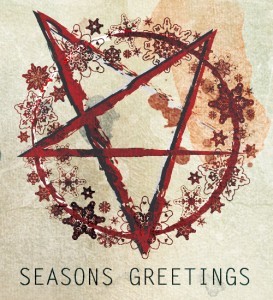
Originally the concept was a part of the Mental Damnation newsletter as a fun-themed approach to the holidays. Since the novel series deals with hell, why not throw some haunting imagery into a Christmas newsletter? After the holidays of 2014, the design didn’t go anywhere until a discussion came up during the summer of 2015 with SANE Clothing for a holiday clothing line. This triggered the memory of the pentawreath and I got to work.
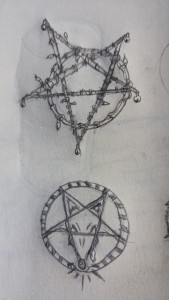
I revisited the original design that was a 15 minute effort in Adobe Illustrator and realized that the design could be drastically improved by steering the concept into a new direction. The next step was drawing thumb sketches of pentagrams and wreaths to familiarize myself with the two types of designs and what intriguing ways the two could be merged together.
The trick was not to make it too seasonal and not too horrific, otherwise one side would overpower the other. Ultimately it took a cartoon approach, allowing me to harmonize the pentagram and the wreath. I went this route since the original concept was meant to be humorous. It stayed fairly true to the original concept with the un-even archaic look of the star.
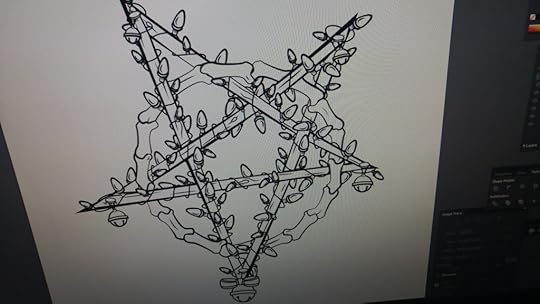
I took one of the thumb sketches from my sketchbook and traced it in Adobe Illustrator to get the thick line work. Afterwards it was brought into Adobe Photoshop where I painted the design to render the texture and shading as seen below:
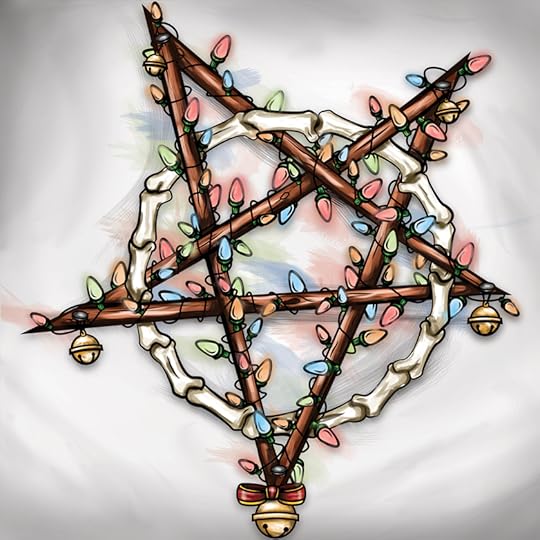
The design has no relation to the Mental Damnation series but was initially inspired by it. This piece allowed me to start thinking outside of the box from my usual graphic design work. It made me work with a cartoon style opposed to my other work which has been either corporate oriented or the ancient civilization themed artwork found in the Mental Damnation series.
November 27, 2015
6 Guidelines to Self Editing Your Novel
So you have a full manuscript complete? You’ve written every word in each chapter from start to finish – congratulations! Give yourself a pat on the back for a job well done It is not easy to complete an entire book. The question is, are you actually done? Unfortunately, you’re not. Writing an engaging book doesn’t happen in the first draft.
In the previous blog post, we discussed what to do when you finish your manuscript. One important thing is taking a break from writing. Returning to your manuscript after having a breather will help give you a fresh perspective on the piece.
Have a professional editor go through your manuscript before you consider the book ready to be published.
Before bringing an editor into the picture, revise the story and edit it on your own. It will take lessen the workload for them and make it a more pleasant experience to work on your book together. Here are some pointers to keep in mind when coming back to edit your manuscript.
1. Organization – Save Copies of Each Revision
If you haven’t already, separate each chapter into their own document. Keep each chapter document in the same folder. This will easily allow you to work on and/or share individual chapters with people. When you start editing, this will make it easier to find scenes without having to sift through one monstrous document.
Be sure to save the original chapter copy as well as the edited version of that chapter for each editing session. Keeping track of your manuscript editing will help you backtrack if ever needed (e.g., if you’ve deleted a paragraph that you need again). It also helps to give you a sense of how many revisions you went through for each chapter. If your word processor has track changes, turn it on as you are editing. It is a highly effective tool to that can show you changes before and after editing.
2. Read Out Loud
An important part of the revision process is to read your story out loud. Yes, it may look odd to people around you (if you are doing this in a café), but it is a vital key to improving the readability of your story. Reading out loud helps mimic the style of the narrator, as if they are telling the story to someone. If your story can easily be spoken, it will be easily read.
3. Second Guess Everything
Question every aspect of your story. It may have made sense when you were first writing. However, if you don’t reconsider a character’s action, their thoughts, a scene or why the story progresses the way it does, then you could miss a potential a reader might catch and criticize. Filling in “plot holes” is another term for this process. Why does the protagonist have a certain emotion towards another character? Why did they take a specific action? What was the purpose of it? That leads to the next point.
4. Every Word Needs To Move the Story Forward
Easier said than done! The primary focus of editing is to remove unnecessary clutter. If the paragraph, sentence or word does not add to the story or progress the plot, why is it there? Get rid of it! You want every page of the novel to have your readers hooked. Use critical thinking while editing. If the section is just filler text, it is safe to say you can delete it. Don’t be concerned about the word count or page numbers; simply tell a good story.
5. Share the Manuscript
Once you have spent countless hours editing, refining your manuscript and pushing yourself to your absolute limit, now you can share it. Gather several of your most trustworthy friends, or fans, that you know will provide critical feedback. Each person will bring you different advice that you could potentially use. This will also provide contrasting viewpoints and notes for when you pass the manuscript onto an editor.
6. When Is It Done Being Edited?
Editing can take months, or even years. You can always have more test readers provide feedback. Make sure you take breaks and come back to the manuscript with fresh eyes because you will always find something that could be improved upon. It can be a slippery slope of not knowing when to claim the book done. You want the manuscript to be top notch but you might also be spinning your wheels, and changing for the sake of changing. This is a judgment call you have to make. You do need to call it done and move onto something new, just don’t wait too long.
Keep these thoughts in mind while editing your novel:
Look over the technicalities – syntax, grammar, sentence structure, etc.
Review the story telling: character development, story arch, plot holes, etc.
Writing the manuscript is the easy part. Coming back and giving it a final polish is where it gets tedious.
Editing can seem like a tedious step. It is also one of the most exciting steps because you’re taking the next level to finalize your book. Don’t be afraid to get your hands, and your manuscript, dirty.
Posts from konnlavery.com
- Konn Lavery's profile
- 156 followers


